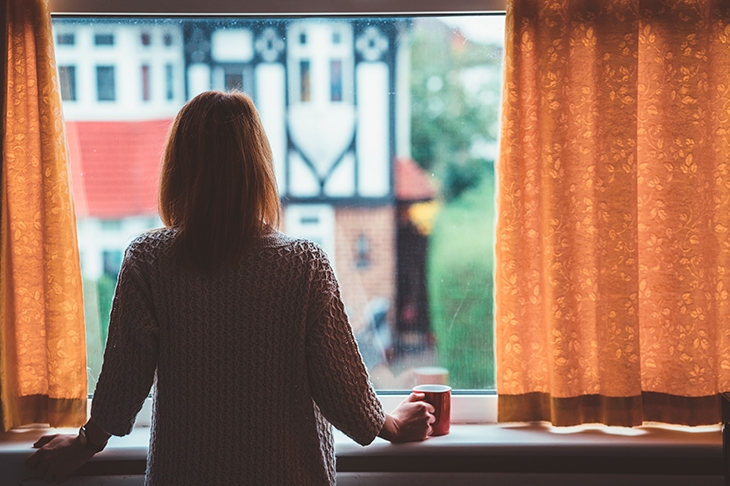When lockdown starts, all kinds of things stop. The first one, in March, was the worst time of my life as a parent, not because of my daughter’s severe disabilities, but because of the lack of support.
Elvi is 19. She has a mental age of three, sleeps four hours a night and can’t walk. She has to be showered, dressed, fed and physically moved around our home. I have learned so much from my beautiful, funny daughter. She works incredibly hard to achieve the smallest things. We were told Elvi wouldn’t live past two and that she was unlikely to speak. In the summer she said her first five-word sentence: ‘I want crisps please, Mummy.’
Through necessity, being Elvi’s mum has made me resilient and resourceful. But the pressure of caring in lockdown nearly broke me and thousands of other parents, and so this second national lockdown is terrifying.

The provision for disabled children was inadequate before anyone had heard of Covid-19. In 2018 The Disabled Children’s Partnership discovered a £1.5 billion funding gap between what was in our children’s legal documents — their education, health and care plans — and what was actually provided by government and local authorities. That meant inadequate schooling; a lack of vital therapies, respite care and equipment; and a constant fight for resources.
Last year a DCP survey found only 4 per cent of families felt they had enough support to safely care for their child. Nearly half of couples split, many citing the pressure of looking after a disabled child while simultaneously battling the system for support. Parents sacrificed work to become full-time carers. The bureaucracy around Elvi was so time-consuming and complicated I was also forced to give up my career. Friends who worked in the City, advertising, the law and the NHS have had to do the same. Many of us were higher-rate taxpayers.That is economically insane.
The pressure of caring in lockdown nearly broke me and thousands of other parents
When the pandemic hit, our families were abandoned. A survey of 4,000 parents of disabled children found that three-quarters had all support withdrawn. The complex network of therapists, doctors, teachers, nurses, social workers, carers, respite and equipment providers that we had spent years fighting to build instantly disappeared. We were on our own and expected to carry out relentless, 24-hour care for months. I had just three or four hours of sleep a night because Elvi’s respite care stopped and her stepfather is a key worker who works late. Her 13-year-old brother effectively babysat while I grabbed an hour’s sleep. At my lowest point I curled up on the floor sobbing with exhaustion while Elvi wailed her high-pitched wail demanding my attention. She had no understanding of lockdown. I am convinced that I managed only because Elvi’s father and Iare divorced so we eventually shared her care. When I heard a mother in west London had been charged with taking her young son’s life, I knew that child would have disabilities. Whatever the verdict, it is telling that I made that leap.
Most families with young children struggled to balance home-schooling and work in lockdown. But with disabled children, parents became not just teachers but physio-therapists, occupational therapists, speech and language therapists and nutritionists. Children with seizures needed monitoring through the night. If they had breathing or feeding tubes parents became nurses too. Where some families were running out of flour, friends with medically fragile kids were running out of sterile equipment.
In May the government gave £10 million to the Family Fund charity to distribute to the most needy families, but I’m afraid that hardly touched the sides. Then, just to reinforce our feelings of isolation, the Coronavirus Act 2020 allowed local authorities to relax their duty of care for children and young adults with disabilities. ‘Families felt utterly abandoned,’ Ali Fiddy of the Independent Provider of Special Education Advice told the education select committee in July.
Our greatest fear was that our children would be exposed to the virus. What would a hospital look like for a child with learning disabilities? Where would they appear on the frailty scores used to decide treatment? Many families could not take that risk. They stayed inside. Most special schools closed anyway. The Children’s Commissioner, Anne Longfield, reported that in April just 18,000 of the 1.1 million children with disabilities in the UK were attending school.
Normality never returned for us, even when lockdown eased. Some respite centres, already perilously underfunded, closed for good; after-school clubs haven’t reopened; children’s hospices that provide vital short breaks for families have limited their numbers. A friend in Brighton is struggling with a complex-needs child who has 24-hour seizures. Her respite centre shut its doors in March and has not reopened. Another mum in Leeds told me she has endured seven months without school or respite and has managed more than 20 episodes of respiratory resuscitation for her child at home.
Hospital appointments have been rescheduled for next year, if at all. Nearly half of parents reported that their disabled child’s health has deteriorated since March. In the first wave, half of community paediatricians were deployed to acute services. Eighty per cent of vital speech and language therapists, occupational therapists and physiotherapists were redeployed. Paediatrician Professor Paul Gringras of Guy’s and St Thomas’ NHS Foundation Trust has said: ‘We need to restore and protect children’s services in the event of another wave because the harm to children outweighs the impact of coronavirus on children. For some the damage will be irreversible.’
I have learned to shout, loudly, for help and we are lucky that Elvi’s school and its residential unit reopened in mid-September — for now, at least. But they are far from the norm in Britain, and we are deeply fearful that they will follow others and close during this new lockdown.
There’s also the worry that cash-strapped local authorities will use Covid as an excuse to cut limited services even further in the future. Yes, demands on the Treasury are greater than ever but we are exhausted. We have been failed. If a series of lockdowns is to be our new normal we need clear guidance, ring-fenced funding and a strong government strategy to help us care for the most vulnerable children in the country.






Comments